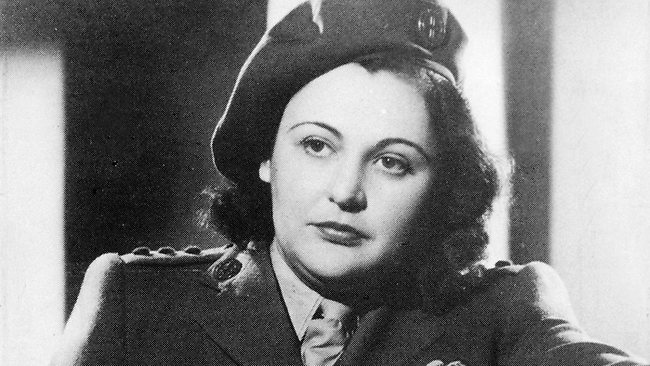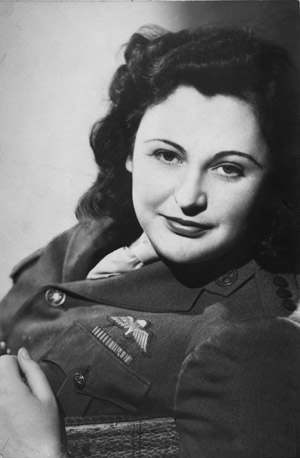During World War II, Australian Nancy Grace Augusta Wake was a Special Operations Executive for the British and was one of the most decorated servicewomen for the Allies. She was also the Gestapo’s (the secret police of Nazi Germany) most wanted person.

On August 30, 1912, Nancy Grace Augusta Wake was born in Roseneath, Wellington, New Zealand to Charles Augustus and Ella Rosieur Wake. She was the youngest of the couple’s six children. In 1914, the family moved to North Sydney, Australia, however, Wake’s father left them and returned to New Zealand and it was just Ella Wake to raise the six children.
Wake attended the North Sydney Household Arts School growing up. She ran away from home to become a nurse when she was sixteen. She had inherited £200 from her aunt and used the money to travel to New York and then London as a journalist. Eventually she moved to Paris and worked for Hearst newspapers as a European correspondent in the 1930s. Wake “saw roving Nazi gangs randomly beating Jewish men and women in the streets” in Vienna and watched as Adolf Hitler and the Nazi Party rose to power in Germany.
In 1937, Henri Edmond Fiocca, a wealthy French industrialist, and Nancy Wake met. The two got married two years later on November 30, 1939. Fiocca was fourteen year’s older than Wake and died in 1943.
When Germany invaded France in 1940, Wake was living in Marseille, France. She became a courier for the French Resistance when France fell to the Nazis. Soon after, Wake joined Captain Ian Garrow’s escape network. She had an ability of evading capture, earning her the nickname the “White Mouse” from the Gestapo. But her life was still in constant danger, especially since the Gestapo intercepted her main and tapped her telephone, so the Resistance had to be extra cautious with her missions.
By 1943, Wake had become the Gestapo’s most wanted person. They put a price of 5 million francs on her head. Around the same time, the network was betrayed and Wake fled to Marseilles. However, her husband, who stayed behind, was captured by the Gestapo and then tortured and killed. Wake didn’t find out until after the war and blamed herself for his death.
Wake made her way over to Britain, where she joined the Special Operations Executive. A colleague at the SOE, Vera Atkins, said Wake was “a real Australian bombshell. Tremendous vitality, flashing eyes. Everything she did, she did well.” It was even noted that she “put the men to shame by her cheerful spirit and strength of character.”
On 29-30 April of 1944, she was parachuted into the Auvergne. From there , she had became a liaison between Captain Henri Tardivat’s local maquis group in the Forest of Tronçais and London. Captain Tardivat found her tangled into a tree and said to her, “I hope that all the trees in France bear such beautiful fruit this year.” The response he got from her was, “Don’t give me that French shit.” During this time, Wake allocated arms and equipment that had been parachuted in while also managing their finances. She also recruited many more members for the room until they were a formidable force made up of about 7,500 men. Wake led the forces on attacks on the local Gestapo headquarters and other German installations. There was one occasion when she found the men protecting a girl who was a German spy and were not able to kill her. Instead Wake decided to perform the execution. Captain Tardivat continuously praised Wake for her fighting spirit. At one point she even used her bare hands to kill an SS Sentry so he couldn’t raise the alarm while her men were on a raid.

When the war ended in 1945, Nancy Wake was immediately awarded with the George Medal along with the United States Medal of Freedom, the Médaille de la Résistance, and the Croix de Guerre three times. She also found out about what happened to her husband around the same time. Wake began working for the British Air Ministry for the embassies in Paris and Prague.
Four years later, she ran in the 1949 Australian federal election for the Sydney seat of Barton as a liberal candidate against Dr. Herbert Evatt and Ben Chifley. She did not win and ran again in 1951 against Evatt. The results were close, but Evatt won with barely 250 more votes.
After the 1951 election, Wake returned to England where she worked an as intelligence officer for the Air Ministry in the department of the assistant chief of air staff at Whitehall. In December, of 1957 Nancy Wake married John Forward, an RAF officer. She subsequently resigned and the couple moved to Australia. In the 1966 federal election, she was endorsed as the Liberal candidate for the Sydney seat of Kingsford Smith, but once again, did not win. In 1985, Wake and Forward left to retire in Port Macquarie, Australia.
That same year, Wake published an autobiography titled The White Mouse, after the nickname given to her by the Gestapo. it was in instant best seller and was reprinted many times.
On August 19, 1997, John Forward died at their home in Port Macquarie. The couple had been married for forty years at that point. Once again, Wake left Australia in 2001 and moved to London where she became a resident at the Stafford Hotel. They celebrated her ninetieth birthday there in 2002 and the managers absorbed most of the costs of her stay there. She left the hotel in 2003 to move to Richmond, London into the Royal Star and Garter Home for Disabled Ex-Service Men and Women.
On the evening of August 7, 2011, Nancy Wake died at Kingston Hospital after being admitted with a chest infection. She was ninety-eight. Wake requested for her ashes to be scattered in central France at Montluçon.